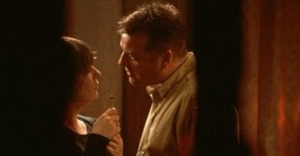
Holy shit. This film is so… fucking… bleak. But it is a must watch for people who think Ray Winstone can’t act. Keep the rubbish in the trash bin, Britain. And don’t under any circumstances let Raymond (Winstone) near your unborn baby. Rage, alcoholism. The relentlessly grim cycle of domestic violence passing from one generation to the next. This drama takes place in the South London projects, but it is by no means confined to that setting. It’s universal, and it won’t stop unless women stop settling for men who beat the shit out of them.
Raymond (Ray Winstone) and Mark (Jamie Foreman) are two South London bros who are also both pretty horrible people. They hang out in Ray’s apartment, drink and drink, and talk shit. Oh yeah, and Ray occasionally takes enough time off drinking and talking shit to beat his wife, Valerie (Kathy Burke) senseless. Ray’s also a father to a little girl (Leah FItzgerald,) and the kid is all too often a witness to Mommy getting her ass handed to her. Ray’s subhuman, a screaming, emotionally impotent cretin, but he thinks he gets off free because he’s all tormented and complex and shit. To listen to his talks with his friend puts you in mind of witnessing something scintillatingly grotesque, like the dietary habits of wild animals.
Valerie has an exhausted mother, Janet (Laila Morse) and a spirited grandmother (Edna Dore) who doesn’t take bunk from anybody, even when Ray threatens to knock the geriatric old bird out cold. She also has a brother Billy (Charlie Creed-Miles,) who’s slightly more likable than the other men, mostly because he doesn’t talk much, and also because he’s not a violent criminal or consciously cruel as much as a weak and pathetic loser. Billy also has a methamphetamine habit he supports by stealing and mooching off his mother.
The five characters converge throughout this practically plotless Brit drama, not as much living as surviving, and it soon becomes clear that something’s going to have to give before all fucking hell breaks lose. Because this life they’re living is not as much of a life as a fox trap where they’re chewing their collective leg off.

The action feels real, like all the best British realism films. The conversations sound like real conversations, and even though the number of curse words is staggering (if you were offended by the bad language in my review, trust me, this isn’t the movie for you) they don’t seem excessive in the context of the film. Writer/director Gary Oldman (yes, that Gary Oldman) has an ear for dialogue, the meaningless yammering bullshit people talk, and the lies people tell themselves to get through the day. Except in his adept hands, the rambling dialogue becomes something really special. Even when Billy’s tattooed hooligan friend Danny (Steve Sweeney) lovingly recites dialogue from “Apocalypse Now” while blitzed out of his mind, the scene has a certain gravity to it, almost touching. It feels like you are seeing something important, something only you are meant to see.
There are a handful of truly amazing scenes in this film, moments so hardcore you forget to breathe, when you see what these fucked-up people’s lives are really about. Several of these involve Ray Winstone monologues, particularly the one about his father where we find out what the title of the movie pertains to. Tight, focused acting there. The kind that takes raw talent. One of the scenes that sticks out to me is the one where Janet, defeated, takes Billy to pick up meth from his dealer. She sits and watches him as he sits in the back of the van doing the drugs, his expression the shallow smile of a satisfied addict, her’s of exhaustion and resignation.
That, to me, is the epitome of desperation. Watching your son shoot up with the crap that you provide? The thing is, nobody wants to be an enabler to their own kid. Nobody wants to be a beaten wife. But in an absence of hope, people settle for so much less than they could be; so much less than they deserve. It’s an ugly cycle, one that is both self-perpetuating and never-ending.
The only thing that keeps me from wholeheartedly recommending this movie is the ending. The whole thing is just bizarre. Whether it’s a happy ending or another plunge into the Hellish abyss of domestic violence, who can tell? I’ll settle for the latter. Regardless, it just made me mad. “Nil By Mouth” is no more a popcorn movie than a film by Michael Haneke or Lars Von Trier is. However, if you like hyper-realistic kitchen sink dramas with amazing actors, this is the movie for you. Just don’t say I didn’t warn you, the level of domestic violence is daunting. This is a harrowing look at people with nothing left to lose, people for which violence is not a distant thing to dread but an inevitable side effect of being alive.
























